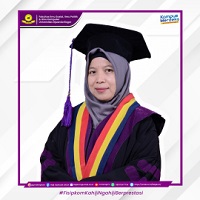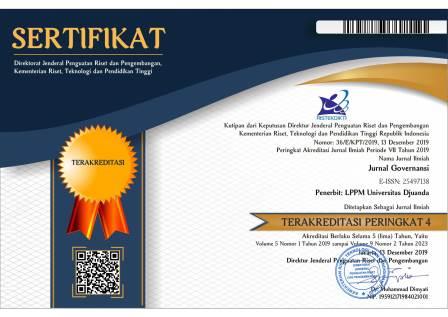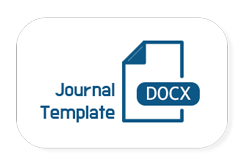COLLABORATIVE BASED TOURISM GOVERNANCE MODEL IN SUSTAINABLE TOURISM DEVELOPMENT
DOI:
https://doi.org/10.30997/jgs.v10i2.12974Keywords:
Collaborative Governance, Tourism Sustainability, Tourism Development, Tourism GovernanceAbstract
Tourism has great potential to improve the economy, create jobs, and support the development of various regions. However, improper tourism management can cause problems such as environmental degradation, excessive tourism and unequal economic benefits. Therefore, it is essential that collaborative-based tourism management can be effective in developing sustainable tourism. This research aims to identify collaborative-based tourism governance research in tourism development. The output of this research is to provide recommendations for a collaborative-based tourism governance model to impact tourism development in the Tenjolaya sub-district, Bogor Regency. The research method used was descriptive qualitative with 28 informants from the sub-district government and the Tenjolaya tourism awareness group. After the data was collected using data collection techniques through observation, interviews, field notes, analytical memos, and document elicitation, the researcher continued the analysis of the data obtained and then confirmed it using data validity techniques. The research results show that tourism governance in Tenjolaya has implemented collaborative governance even though it is still local, so every indicator still needs to be optimally fulfilled using the good tourism governance model and the public-private partnership model. Thus, tourism governance in Tenjolaya must focus on good tourism collaboration so that tourism goals in Tenjolaya can be achieved based on fulfilling indicators that support good tourism governance, good tourism development and good tourism sustainability.
References
Abdussamad, Z. (2022). Buku Metode Penelitian Kualitatif. CV. Syakir Media Press.
Abidin, Y. (2013). Pembelajaran Bahasa Berbasis Pendidikan Karakter. Bandung: Refika Aditama.
Afrizal, M. . (2016). Metode Penelitian Kualitatif Sebuah Upaya Mendukung Penggunaan Penelitian Kualitatif dalam Berbagai Disiplin Ilmu. Jakarta: Rajagrafindo Persada.
Agfianto, T., Antara, M., & Suardana, I. W. (2019). Dampak Ekonomi Pengembangan Community Based Tourism Terhadap Masyarakat Lokal Di Kabupaten Malang (Studi Kasus Destinasi Wisata Cafe Sawah Pujon Kidul). Jurnal Master Pariwisata (JUMPA), 5(2), 259–282. https://doi.org/10.24843/jumpa.2018.v05.i02.p03
Apriliani, A., Ramdani, F. T., Fitria, M., Wahyudin, C., Assayuti, M. jalaludin, Zulfa, A. A., Munawaroh, E., & Aryati, S. (2023). Cultural Reserve Edu-Tourism Governance. Jurnal Qardhul Hasan; Media Pengabdian Kepada Masyarakat, 9(3), 227–235.
Apriliani, A., Rita, R., & Azahari, R. (2018). Kemitraan Pemerintah Dan Swasta Dalam Pengembangan Wisata Geopark Ciletuh-Palabuhan Ratu Kabupaten Sukabumi. Administratie Jurnal Administrasi Publik, 1(1), 30–38.
Bahri, A. S., Sylvester L, V., & Lesmana, D. (2019). Pemberdayaan Perempuan Pada Bidang Homestay di Desa Wisata Batulayang Kecamatan Cisarua, Bogor-Jawa Barat. Jurnal Pemberdayaan Pariwisata, 1(1), 41–48.
Bhuanaputri, N. K. A. W., Putra, I. P. R. D., Wahyudi, I. M. I., Ratih, N. M. A. C., & Adam, M. D. (2021). Konsep Community Based Tourism Sebagai Strategi Pengembangan Kain Songket Sidemen di Bali. Syntax Idea, 3(8), 1916–1923.
Candranegara, I. M. W., Mirta, I. W., Sedana, I. D. G. P., & Wirata, G. (2022). Hexahelix Concept in The Development of Eco-Tourism Area in The Kelating Traditional Village Eco-Tourism Area, Kerambitan District, Tabanan Regency. Iapa Proceedings Conference, 144–157. https://doi.org/10.30589/proceedings.2022.688
Franco, M., & Estevão, C. (2010). O papel das parcerias público-privadas de turismo no desenvolvimento regional: proposta de um modelo conceptual. Cadernos EBAPE.BR, 8(4), 600–612.
Harahap, N. (2020). Penelitian Kualitatif. Medan: Wal ashri Publishing.
Imanina, K. (2020). Penggunaan Metode Kualitatif dengan Pendekatan Deskriptif Analitis dalam Paud. JURNAL AUDI: Jurnal Ilmiah Kajian Ilmu Anak Dan Media Informasi PUD, 5(1), 45–48.
Kedasi Silayar, Ika Sartika, D. M. (2021). Tata Kelola Pemerintahan Kolaboratif Dalam Pengembangan Pariwisata Di Kabupaten Kepulauan Sula. Jurnal Renaissance, 6(02), 859–874.
Kurniawan, A. R. (2020). Tantangan Pengembangan Pariwisata Berbasis Masyarakat Pada Era Digital Di Indonesia (Studi Kasus Pengembangan Pariwisata Berbasis Masyarakat Di Pangalengan). TORNARE - Journal of Sustainable Tourism Research, 3(1), 1–10. https://doi.org/10.24198/tornare.v2i2.25418
Oka, I. M. D., Sudiarta, M., & Darmayanti, P. W. (2021). Warisan Cagar Budaya sebagai Ikon Desa Wisata Kaba-Kaba, Kabupaten Tabanan, Bali. Mudra Jurnal Seni Budaya, 36(2), 163–169. https://doi.org/10.31091/mudra.v36i2.1459
Putra, D. P. B. P. (2020). Partisipasi Masyarakat Lokal Dalam Pengembangan Desa Wisata Carangsari. Jurnal Masyarakat Dan Budaya, 22(2), 1–15. https://doi.org/10.14203/jmb.v22i2.838
Ridwanullah, M., Rahmawati, R., & Hernawan, D. (2021). Pemetaan Tata Kelola Pengembangan Pariwisata. Jurnal Governansi, 7(1), 9–18. https://doi.org/10.30997/jgs.v7i1.3106
Rosardi, R. G. (2020). Model Pentahelix Dalam Pengembangan Pariwisata Berkelanjutan Di Kabupaten Batang Jawa Tengah. Ristek : Jurnal Riset, Inovasi Dan Teknologi Kabupaten Batang, 4(2), 7–17.
Sunaryo, B. (2013). Kebijakan Pembangunan Destinasi Pariwisata Konsep dan Aplikasinya di Indonesia (1st ed.). Gava Media.
Sya, A., Zid, M., Irma S, A., Putri, A. E., & Mainaki, R. (2021). Pengelolaan Destinasi Pariwisata Berkelanjutan: Kasus Tanjung Lesung Provinsi Banten. Jurnal Geografi, Edukasi Dan Lingkungan (JGEL), 5(1), 27–32. https://doi.org/10.22236/jgel.v5i1.5311
Syafrini, D., Nurlizawati, N., & Amelia, L. (2022). Pemberdayaan Masyarakat Dalam Pengelolaan Homestay Berbasis Komunitas Lokal di Desa Wisata Nagari Sungai Pinang, Pesisir Selatan Sumatera Barat. Abdi: Jurnal Pengabdian Dan Pemberdayaan Masyarakat, 4(2), 459–464. https://doi.org/10.24036/abdi.v4i2.397
Utama, I. G. B. R., & Mahadewi, N. M. E. (2018). Metode Penelitian Pariwisata dan Perhotelan. Andi.
Wahyudin, C., Apriliani, A., Ramdani, F. T., Pratidina, G., & Seran, G. G. (2023). a Bibliometric Analysis Collaborative Governance of Plastic Reduction Through the Transformation Industry. Journal of Engineering Science and Technology, 18(4), 85–93.
Wahyudin, C., Subagdja, O., & Iskandar, A. (2023). Desain Model Collaborative Governance Dalam Penanganan Pengurangan Penggunaan Plastik. Jurnal Governansi, 9(2), 151–162. https://doi.org/https://doi.org/10.30997/jgs.v9i2.8004
Zakaria, Z., Sophian, R. I., & Gusriani, N. (2019). Environmental Aspect in Infrastructure Planning Using Starlet-Perdana Model. IOP Conference Series: Earth and Environmental Science, 248(1), 1–12. https://doi.org/10.1088/1755-1315/248/1/012013
Zakaria, Z., Sophian, R. I., Muljana, B., Gusriani, N., & Zakaria, S. (2019). The Hexa-Helix Concept for Supporting Sustainable Regional Development (Case Study: Citatah Area, Padalarang Subdistrict, West Java, Indonesia). IOP Conference Series: Earth and Environmental Science, 396(The 2nd International Conference on Smart City Innovation), 1–12. https://doi.org/10.1088/1755-1315/396/1/012040
Downloads
Published
How to Cite
Issue
Section
License
Copyright (c) 2024 cecep wahyudin, Robby Firliandoko, Nadia Amalia, Agra Alfin Zulfa

This work is licensed under a Creative Commons Attribution-ShareAlike 4.0 International License.
Authors who publish with Jurnal Governansi agree to the following terms:
- Authors retain copyright and grant the journal right of first publication with the work simultaneously licensed under a Creative Commons Attribution 4.0 International License that allows others to share the work with an acknowledgement of the work's authorship and initial publication in Jurnal Governansi.
- Authors are able to enter into separate, additional contractual arrangements for the non-exclusive distribution of the journal's published version of the work (e.g., post it to an institutional repository or publish it in a book), with an acknowledgement of its initial publication in Jurnal Governansi.
- Authors are permitted and encouraged to post their work online (e.g., in institutional repositories or on their website) prior to and during the submission process, as it can lead to productive exchanges, as well as earlier and greater citation of published work.



















